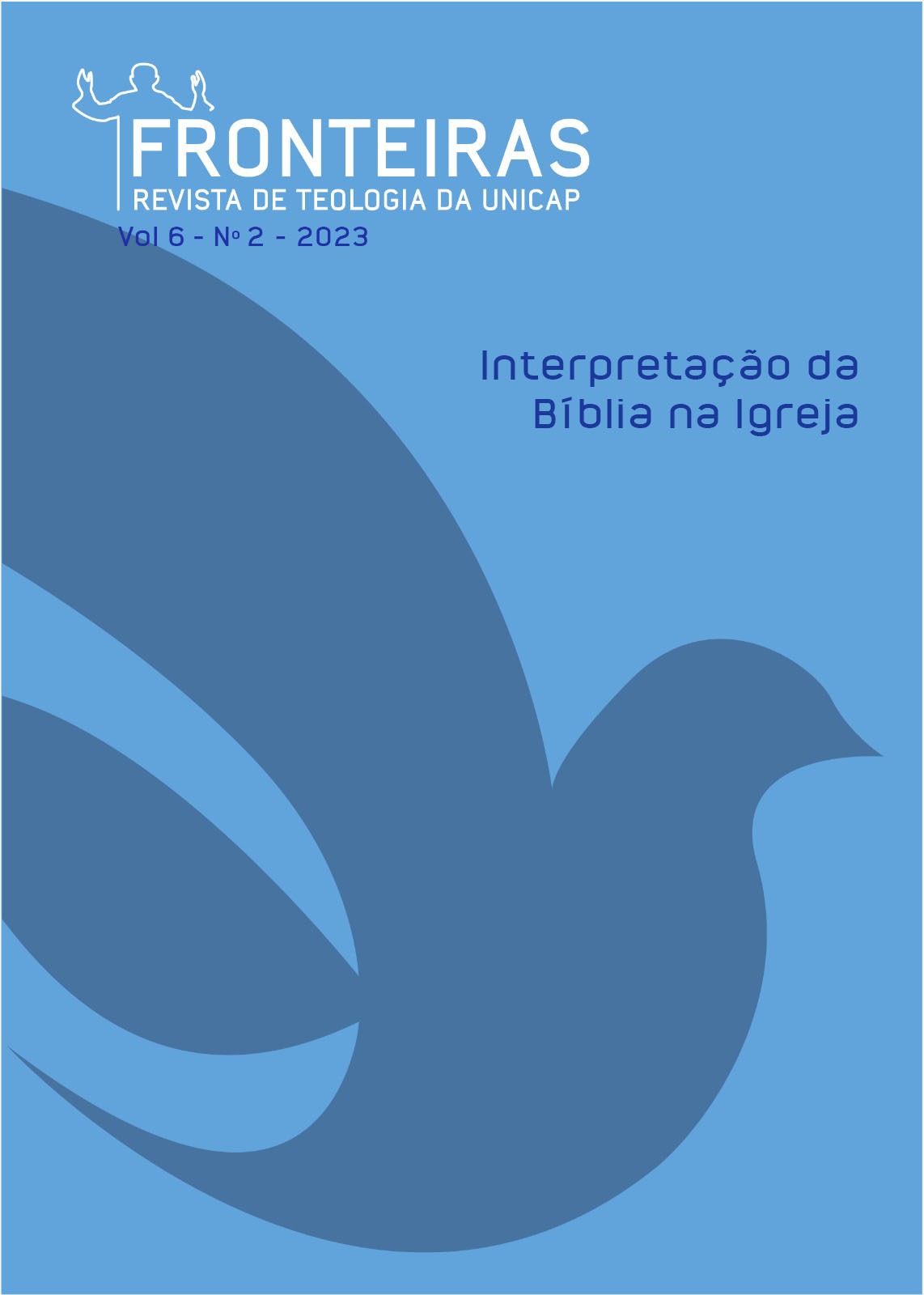Kenotic Pastoring
the Action of a Church “which goes forth”
DOI:
https://doi.org/10.25247/2595-3788.2023.v6n2.p297-313Keywords:
Kenosis, Missionary community, Pope Francis, Urs von BalthasarAbstract
The article studies a proposal of pastoral action in which is highlighted the kenotic character, that is, turning oneself towards meeting and service of persons. The objective of the article is to highlight that kenotic action is part of Pope Francis’ proposal in the Apostolic Exhortation Evangelii Gaudium, and that this can be illustrated by the theology of Urs von Balthasar. The methodology relates the authors studied, starting by verifying the theme of kenosis in the theology of Urs von Balthasar and the presence of kenosis in the life of Jesus, especially highlighted in the Last Supper. The study of the theology of Urs von Balthasar refers to the trinitarian kenosis drawn out in the kenosis of Christ and in the ecclesial kenosis, among diverse traits in the realization of Church. The model of Jesus Is considered, in a life of service, and at the Supper with the washing of the feet. The article selects instructions from Pope Francis for the Church in our times, highlighting the neologism of making the Church “take the first step” and positioning itself as “a Church which goes forth”. It is implied that the mission is better developed in communities open to dialogue and to service in the world, in the line of synodality. It concludes that the kenotic character must stand out in the Church’s pastoral dimensio, valued by Urs Von Balthasar and translated in the pastoral orientations of Pope Francis.
Downloads
References
BALTHASAR, H. U. von. A Los Creyentes desconcertados. Madrid: Biblioteca de Autores Cristianos, 1998a.
BALTHASAR, H. U. von. Antiguo Testamento. In: BALTHASAR, H. U. von. Glória. Madrid: Encuentros, 2000a. v. V.
BALTHASAR, H. U. von. Católico: aspectos del misterio. Madrid: Encuentro, 1988.
BALTHASAR, H. U. von. i. In: BALTHASAR, H. U. von. Theo Dramatica: Theological Dramatic Theory. San Francisco: Ignatius, 1998b. v. III.
BALTHASAR, H. U. von. Estados de vida del cristiano. Madrid: Encuentros, 1994a.
BALTHASAR, H. U. von. El complejo antirromano. Madrid: Biblioteca de Autores Cristianos, 1981.
BALTHASAR, H. U. von. La percepcion de la forma. In: BALTHASAR, H. U. von. Glória. Madrid: Encuentros, 2000b. v. I.
BALTHASAR, H. U. von. Luz de la Palabra: comentarios a las leituras dominicales. Madrid: Encuentro, 1994b.
BALTHASAR, H. U. von. My work in retrospect. San Francisco: Ignatius,1993.
BALTHASAR, H. U. von. Mysterium Paschale: The Mystery of Easter. San Francisco: Ignatius, 2005a.
BALTHASAR, H. U. von. Por qué soy todavia Cristiano? Por qué permanezco en la Iglesa? Salamanca: Sígueme, 1975.
BALTHASAR, H. U. von. Puntos Centrales de la Fé. Madrid: Biblioteca de Autores Cristianos, 1985.
BALTHASAR, H. U. von. Razing the bastions. San Francisco: Ignatius, 1994c.
BALTHASAR, H. U. von. Spirito e Istituzione. Brescia: Morccelliana, 2005b.
BALTHASAR, H. U. von. Spiritus Creator. Brescia: Morccelliana, 2005c.
BALTHASAR, H. U. von. Sponsa Verbi. Brescia: Morccelliana, 2005d.
CODA, P. Dalla Trinità: l’avvento di Dio tra storia e profezia. Roma: Cittá Nuova, 2011.
DIANICH. S. A descoberta do “outro” em uma Igreja em saída. IHU. Disponível em: <http://www.ihu.unisinos.br/78-noticias/579941-a-descoberta-do-outro-em-uma-igreja-de-saida-artigo-de-severino-dianich>. Acesso em: 7 jun 2018.
FRANCISCO. Angelus. 20 de setembro de 2020. (2020a). Disponível em: <http://www.vatican.va/content/francesco/pt/angelus/2020/documents/papa-francesco_angelus_20200920.html>. Acesso em: 19 nov 2020.
FRANCISCO. Bula Misericordiae Vultus. 11 abril 2015. São Paulo: Paulus, 2015.
FRANCISCO. Carta Encíclica Fratelli Tutti: sobre a fraternidade e a amizade social. 3 outubro 2020. São Paulo: Paulus, 2020b.
FRANCISCO. Discurso do Papa Francisco aos bispos do México em sua viagem apostólica. 2016 a. Disponível em:<https://www.google.com/url? sa=t&source=web&rct=j&url=http://www.vatican.va/content/francesco/pt/speeches/2016/february/documents/papa-francesco_20160213_messico-vescovi.html&ved=2ahUKEwi39eK2zKD4AhVTjZUCHaZKCzUQFnoECAYQAQ&usg=AOvVaw1Y66elxoa0wOLYIu4HjYvB>. Acesso em: 21 mai 2020.
FRANCISCO. Discurso do Papa Francisco aos participantes no Congresso eclesial da Diocese de Roma. 2016 b. Disponível em: <http://www.vatican.va/content/francesco/pt/speeches/2016/june/documents/papa- francesco_20160616_convegno-diocesi-roma.html>. Acesso em: 2 jan 2019.
FRANCISCO. Exortação Apostólica Evangelii Gaudium: sobre o anúncio do Evangelho no mundo atual. 24 novembro 2013 (2013a). São Paulo: Paulus, 2013.
FRANCISCO. Nei Tuoi Occhi è la mia Parola: Omilie e discorsi di Buenos Aires 1999-2013. Milano: Rizzoli, 2016c.
FRANCISCO. Pronunciamentos do Papa Francisco no Brasil. São Paulo: Paulus, 2013b.
KASPER, W; SAUTER, G. La Chiesa luogo dello Spirito: Linee di ecclesiologia pneumatologica. Milano-Brescia: Di Andrea/Queriniana, 1980.
MIRANDA, M. F. A Reforma de Francisco: Fundamentos Teológicos. São Paulo: Paulinas, 2017.
REPOLE, R. O sonho de uma Igreja evangélica. A eclesiologia do Papa Francisco. Brasília: Edições CNBB, 2018. v.4.
RIBEIRO, C. S. M. Mysterium Paschale: a quenose de Deus segundo Hans Urs von Balthasar. São Paulo: Paulus, 2009.
Downloads
Published
Issue
Section
License
Copyright (c) 2023 Maria Teresa de Freitas Cardoso, André Luiz Bordignon Meira

This work is licensed under a Creative Commons Attribution 4.0 International License.
Autores que publicam nesta revista concordam com os seguintes termos:
- Autores mantém os direitos autorais e concedem à Fronteiras - Revista de Teologia da Unicap o direito de primeira publicação, com o trabalho simultaneamente licenciado sob a Licença Creative Commons Attribution que permite o compartilhamento do trabalho com reconhecimento da autoria e publicação inicial nesta Revista.
- Autores têm autorização para assumir contratos adicionais separadamente, para distribuição não-exclusiva da versão do trabalho publicada nesta revista (ex.: publicar em repositório institucional ou como capítulo de livro), desde que reconheça e indique a autoria e a publicação inicial nesta Revista.
- Autores têm permissão e são estimulados a publicar e distribuir seu trabalho online (ex.: em repositórios institucionais ou na sua página pessoal) a qualquer momento depois da conclusão de todo processo editorial, já que isso pode gerar alterações produtivas, bem como aumentar o impacto e a citação do trabalho publicado (Veja O Efeito do Acesso Livre).






















